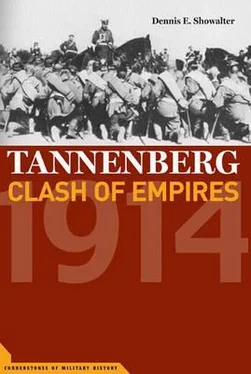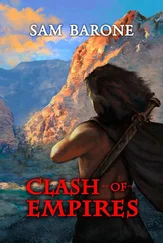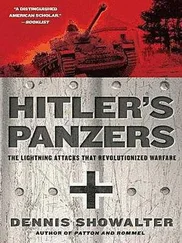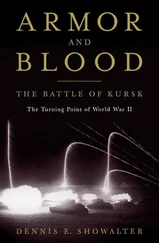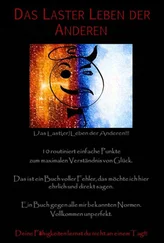4l Grenadier-Regiment Nr. 1, 22, 24; Fritz Rohde, 2. Ostpreussisches Feldartillerie-Regiment Nr. 52 (Oldenburg, Berlin, 1928), 9–10.
42Reichsarchiv, Weltkrieg II, 59 ff.; François, Marneschlacht und Tannenberg, 167.
43Gerhard Lapp, Das 1. Ostpreussische Feldartillerie-Regiment Nr. 16 (Oldenburg, Berlin, 1928), 13; Grenadier-Regiment Nr. 1, 24.
44François, Marneschlacht und Tannenberg, 170. Cf. the general account of Stallupönen in Reichsarchiv, Weltkrieg II, 73 ff., with the major regimental histories: Alfred Bülowius and Bruno Hippler, Das Infanterie-Regiment v. Boyen (5. Ostpreussisches) Nr. 41 im Weltkriege 1914–1918 (Berlin, 1929), 9 ff.; Fritz Schillmann, Grenadier-Regiment König Friedrich Wilhelm I (2. Ostpreussisches) Nr. 3 im Weltkriege 1914–1918 (Berlin, 1924), 22–23; Georg Dorndorf, Das Infanterie-Regiment Nr. 43 (Berlin, 1923), 13 ff.; Grenadier-Regiment Nr. 1, 26 ff.
45David Landes, Revolution in Time: Clocks and the Making of the Modern World (Cambridge, Mass., 1983), 51–52, 95 ff.
46Comments on Schäfer to Conta, Mar. 15, 1929, in BA-MA, Nachlass François, N 274/18.
47Bülowius and Hippler, IR 41, 13–14.
48Elze, Tannenberg, 101; record of phone conversation, 3:30 p.m., ibid., 215; and François, Marneschlacht und Tannenberg, 170 ff. François blamed his chief of staff for the incident, and demanded that officer’s immediate relief for disloyalty. Not until after the battle did he seek to withdraw his complaints. Telegram of Aug. 31, 1914, in BA-MA, Nachlass François, N 274/16.
49Prittwitz to François, 6:50 p.m.; record of phone conversation, François to Prittwitz, 8:00 p.m.; and report of 11:15 p.m. Aug. 17, 1914, in Elze, Tannenberg, 215–216.
50Bülowius and Hippler, IR 41, 14–15.
51General accounts critical of Rennenkampf’s behavior include Ironside, Tannenberg, 85 ff.; Golovine, 1914, 114 ff.
52Army orders of Aug. 17 and Aug. 18; communication of Aug. 18 to OHL; order of Aug. 18 to I Corps, in Elze, Tannenberg, 215 ff.
53François, Marneschlacht und Tannenberg, 179.
54Reichsarchiv, Weltkrieg II, 79 ff.
55 Luftstreitkräfte, 90–91.
56Gemmp, Nachrichtendienst II, 1, 30; 1st Lt. Randewig, “Deutsche Fun-kaufklärung in der Schlacht bei Tannenberg,” Wissen und Wehr XII (1932), 129–130, 139. Not until the end of Sept., 1914, did the Germans break the Russian field code.
57Record of telephone conversation between I Corps and AOK, 4:10 p.m. Aug. 19, Elze, Tannenberg, 218–219; François, Marneschlacht und Tannenberg, 180.
580rders to XVII Corps and I Corps, Aug. 19, in Elze, Tannenberg, 219; François, Marneschlacht und Tannenberg, 181–182.
59“Bei Gumbinnen findet heute grosses Gefecht statt,” Order to Air Detachment 16, 2:45 a.m., Aug. 20, in Elze, Tannenberg, 221.
60Order to 3rd Reserve Division, 4:50 p.m. Aug. 19, in ibid., 220; and Reichsarchiv, Weltkrieg II, 83–84.
6. FIRST CONTACT: GUMBINNEN
1Hermann von François, Marneschlacht und Tannenberg (Berlin, 1920), 182–183; N. N. Golovine, The Russian Campaign of 1914, tr. A. G. S. Muntz (Leavenworth, Kans., 1933), 123.
2E. G. “Der Kampf urn Dörfer,” Militär-Wochenblatt, 1881, 30–31; “Gedanken über den Angriff auf befestigte Feldstellungen,” Jahrbücher für die deutsche Armee und Marine, 119 (1899), 295–309.
3For the attack of Falk’s division cf. Traugott Hoffmann and Ernst Hahn, Geschichte des Infanterie-Regiments Graf Dönhoff (7. Ostpreussischen) Nr. 44 1860–1918 (Berlin, 1930), 108–109; Alfred Dieterich, Geschichte des Grenadierregiments König Friedrich der Grosse (3. Ostpreussischen) Nr. 4 (Berlin, 1928), 653–654; and the detailed account in Kurt Hennig, Das Infanterie-Regiment (8. Ostpreussischen) Nr. 45 (Berlin, 1928), 20 ff. The Russian artillery’s role in this sector is presented in General V. Chernavin, “28th Artillery Brigade in the Vicinity of Gumbinnen, Aug. 6–7 (19–20), 1914,” Hoover Institution Archives, Nikolai N. Golovin Collection, Box 13.
4Franz von Gottberg, Das Grenadier-Regiment Kronprinz (1. Ostpreussischen) Nr. 1 im Weltkriege, Vol. I (Berlin, 1927) 31 ff; Alfred Bülowius and Bruno Hippler, Das Infanterie-Regiment von Boyen (5. Ostpreussischen) Nr. 41 im Weltkriege 1914–1918 (Berlin, 1929), 16–17; and Germany, Reichsarchiv, Der Weltkrieg 1914 bis 1918, Vol II (Berlin, 1925), 87–88.
5Gerhard Lapp, Das 1. Ostpreussische Feldartillerie-Regiment Nr. 16 (Berlin, 1928), 15–16; and Grenadier-Regiment Nr. 1, 35–37, are the fullest accounts of this mix-up.
6For Mackensen’s peacetime career see his Briefe und Aufzeichnungen, ed. Wolfgang Foerster (Leipzig, 1938), and Rüdt von Collenberg’s völkisch-popular Mackensen (Berlin, 1935).
7William Clive, Fighting Mac. The Climb to Disaster of Sir Hector Macdonald (London, 1977), 300.
8A vivid account of XVII Corps’s night march is Kurt Hesse, Der Feldherr Psychologos (Berlin, 1922), 3 ff. Hesse was a company officer in the 5th Grenadiers, whose regimental history, Alfred Seydel, Das Grenadier-Regiment König Friedrich I (4. Ostpreussisches) Nr. 5 im Weltkriege (Berlin, 1926), 35 ff., is also evocative. Cf. Walter Richter, Das Danziger Infanterie-Regiment Nr. 128, Vol. I (Zeulenroda, 1930), 12–13.
9Hesse, Feldherr Psychologos, 14–15.
10 Ibid., 16.
11Mackensen, Briefe und Aufzeichnungen, 36–37; Reichsarchiv, Weltkrieg II, 90.
12Ernst Zipfel, Geschichte des Koniglich Preussischen Husaren-Regiment Fürst Blücher von Wahlstätt (Pommersches) Nr. 5 (Zeulenroda, 1930), 21 ff.
13Mackensen, Briefe und Aufzeichnungen, 38; Reichsarchiv, Weltkrieg II, 90; von Keiser, Geschichte des Inf.-Regis. v.d. Marwitz (8. Pomm.) Nr. 61 im Weltkriege 1914–1918 (Oldenburg, 1928), 11 ff.; Wilhelm Preusser, Das 9. Infanterie-Regiment Nr. 176 im Weltkrieg (Berlin, 1931), 35 ff.; Edmund Schulemann, Das Kulmer Infanterie-Regiment Nr. 141 im Weltkriege (Oldenburg, 1926), 14 ff. General Ardaridi, “Die 27. russische Infanterie-Division in den Kämpfen bei Stallupönen und Gumbinnen am 17. und 20. August, 1914,” Schweizer Monatshefte für Offiziere (Apr.-May 1928) 113–123, 153–163, is an account from the perspective of the formation that bore the brunt of Mackensen’s attack.
14Richter, IR 128, 13–14.
15Cf. inter alia the Exerzier-Reglement für die Infanterie von 29. Mai 1906, rev. ed. (Berlin, 1909); Balck, “Das Exerzierreglement für die Infanterie von 29. Mai 1906,” Jahrbücher für die deutsche Armee und Marine, 131 (1906), 111–135; and Otto Schulz, “Gruppenkolonne und Kompagniekolonne,” ibid., 136 (1909), 35–38.
16See, for example, the description of the death of Major Haupt, commanding 1/128, from the diary of one of his officers, quoted in Richter, IR 128, 15–16.
17Von Beseler, “Ingenieurkunst und Offensive,” Vierteljahresheft fur Truppen-fuhrung und Heereskunde VII (1910), 362–384; Immanuel, “Der Infanteriepionier im Feldkriege,” Kriegstechnische Zeitschrift XV (1912), 145–157.
18Seydel, 5. Grenadiere, 38–39.
19Undated letter of Lt. Wartze, quoted in Schulemann, IR 141, 15–16.
20Hesse, Feldherr Psychologos, 28–29.
Читать дальше
